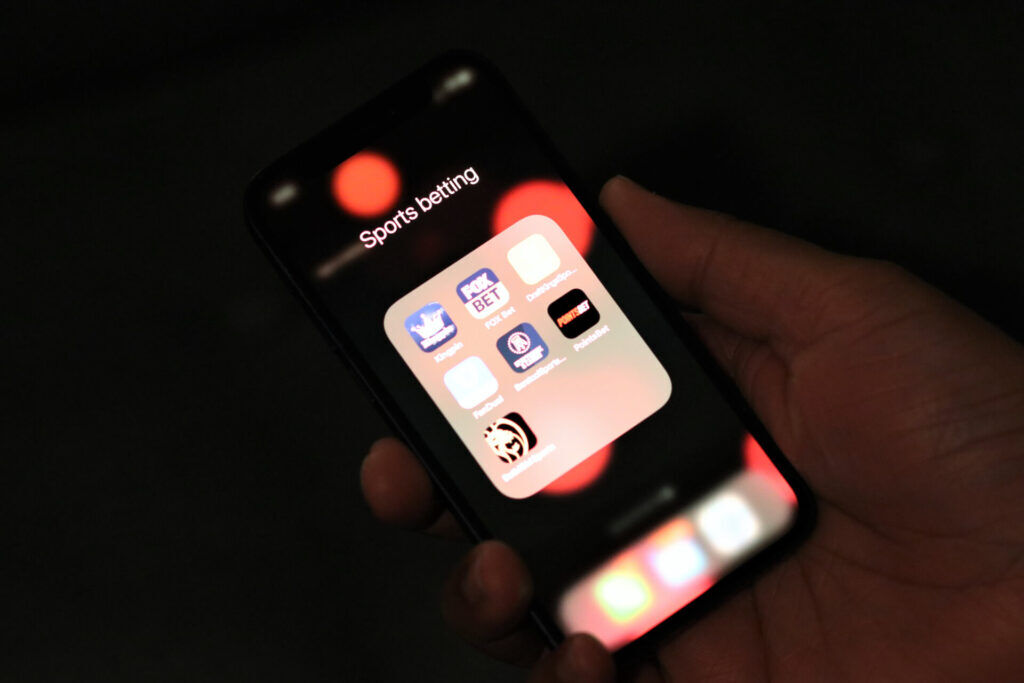This article was republished with permission from WTOP’s news partners at Maryland Matters. Sign up for Maryland Matters’ free email subscription today.

This content was republished with permission from WTOP’s news partners at Maryland Matters. Sign up for Maryland Matters’ free email subscription today.
Frustrated that Maryland is lagging behind other states in a potentially lucrative industry, Gov. Lawrence J. Hogan Jr. is urging the commission that oversees sports wagering to approve mobile betting by the time the NFL starts its 2022 season in September.
In a letter to the Sports Wagering Application Review Commission (SWARC) on Tuesday, Hogan (R) urged the panel to “immediately accelerate and intensify your efforts” to grant mobile licenses.
Currently Marylanders can gamble on sporting events only by traveling to a handful of casinos — MGM National Harbor in Oxon Hill, Live! in Hanover, Horseshoe in Baltimore, Ocean Downs in Berlin and Hollywood in Perryville.
A small number of sports bars have also been approved and are in the process of getting their betting operations open.
But online wagering — where the public can place bets on a phone or laptop — is still not available here, even though voters approved a sports wagering referendum in 2020.
Hogan’s letter to the SWARC comes as industry observers grow pessimistic about Maryland’s hopes of launching mobile betting this year.
“Online Maryland sports betting in 2022 likely dead,” read a recent headline on the industry website Legal Sports Report. The site blamed “a lengthy bureaucratic process for Maryland sports betting [that] continues to have no end in sight.”
Action Network, a prominent betting-related site, reported in April that “Maryland’s online sports betting rollout is longest delay in U.S. history.”
While critics accuse the SWARC of dragging its feet, the state lawmakers who were instrumental in crafting Maryland’s sports wagering law defend the commission. They say the panel is adhering to their legislation, which placed a premium on making sure that local, women-owned and minority-owned entrepreneurs are able to compete against the national sportsbooks that dominate elsewhere.
“We all want mobile betting to start, but we have to launch it in a way where we’re following the law and the intent of the bill,” said Del. Darryl Barnes (D-Prince George’s), the chair of the Legislative Black Caucus. “And that was to try to give minorities an opportunity to participate in this industry.”
At the heart of the state’s efforts to guarantee an equal footing is a “disparity study” that documents barriers to entry that non-white and female-led businesses face gaining access to capital and market-share. The SWARC is relying heavily on the advice it is receiving from the attorney general’s office, making it unlikely that the SWARC will alter its strategy.
In his letter, Hogan blamed an “overly-complex” law that he said was “skewed to appease special interest groups and organizations.” He did not identify them. Hogan also blamed “bureaucratic hurdles and legal obstacles placed by the Office of the Attorney General. Hogan and Attorney General Brian Frosh (D) have a frosty relationship.
“With only five physical locations in the state currently accepting sports wagers, Maryland is losing tens of millions fo dollars in economic investment and education revenue that should be going toward our public schools and students,” he wrote. “The time for deliberation has passed.”
Hogan called on the SWARC to:
- Set a “firm and transparent timeline” for the launch of mobile wagering “at your next meeting.” (The panel meets on Thursday.)
- Release the drafts version of its “application and accompanying regulations,” to enable would-be sportsbooks to prepare comments
- Adopt an expedited process — similar to the one used last year, to allow bricks-and-mortar locations to open their doors — so that “experienced gaming operators that are already licensed for mobile wagering in numerous other states” can begin accepting bets here
Although Hogan is pushing to get mobile wagering up by September, for Week 1 of the NFL season, an industry source told Legal Sports Report that “a launch by the 2023 Super Bowl is likely a stretch.”
The SWARC is unlikely to get the disparity study “until at least summertime,” Action Network reported. “Only then can the Maryland Lottery begin the rules and applications process, which will take even more time.”
“Maryland has made $1.8 million in four months of retail sports betting, but that’s a drop in the bucket compared to what’s expected from online betting,” the site reported. “Virginia, its neighbor to the south, has already made $24.6 million in taxes off of sports betting.”
Proceeds from sports wagering help fund a decade-long education reform plan called the Blueprint for Maryland’s Future.
Sen. Craig Zucker (D-Montgomery), another lawmaker involved in crafting Maryland’s sports wagering law, said the SWARC is “following the letter of the law.”
“The whole intent of the mobile apps was to make sure that everyone had the opportunity to get in the market,” he said. “That includes your small, minority- and women-owned businesses. It’s an independent commission that’s been appointed by the General Assembly and the governor to get this right. That’s the most important thing.”







